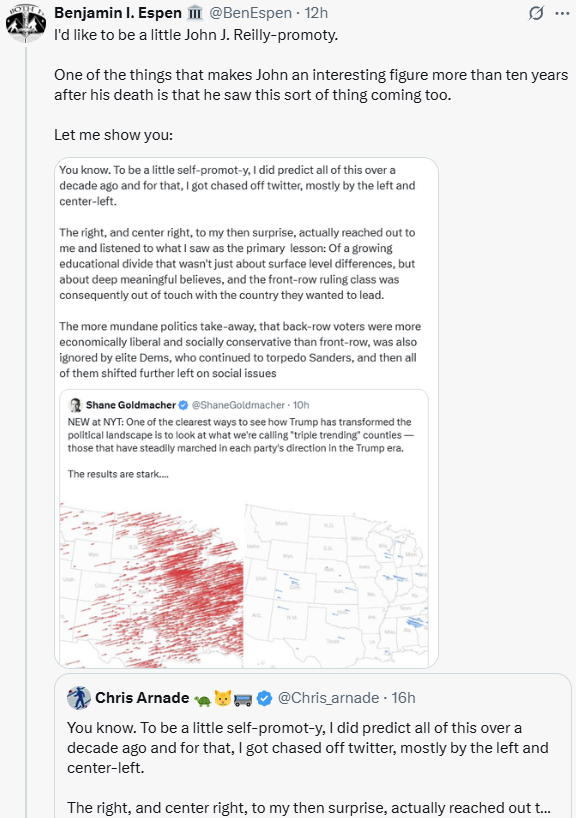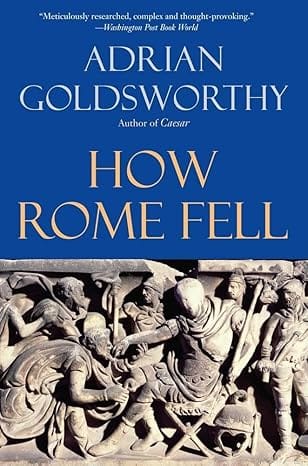The Long View: The Menace of Multiculturalism in America


Seeing this book had a foreword by Dinesh D'Souza, who has descended into hackery in the twenty years since this review was written, made me think of the fantastic Twitter exchange above.
The book John reviews here isn't very good, but his discussion of the issues is much better than the book itself. For instance, Schmidt makes the argument that the supremacy of English in the US probably helped preserve national cohesion during the two world wars, since the US had [and has] a large minority of German ethnics, who might have otherwise identified with the states we fought against. There is probably something to this, but linguistic policy is too blunt an instrument to really speed along assimilation.
Some of my great-grandparents in Indiana spoke German at home, but forced their children to speak English in the years between the two world wars, probably to make sure that they were thoroughly Americanized. This was a topic of some controversy at the time, as Teddy Roosevelt's hyphenated American speech to Knights of Columbus indicates. In the US, a social and political compromise emerged over time, that seems to have worked well. Explicit prohibitions on the speaking of German, or the use of German for public business weren't common, or needed. Woodrow Wilson's administration was less-forgiving on this subject than Teddy's was, and you can see the kind of resentment Wilson's policies created in contrast to TR's.
Contra Schmidt, there is a kind of multi-lingual multi-cultural society that works well. The Austro-Hungarian Empire and the Holy Roman Empire that preceded it are notable examples. Precisely insofar as these were imperial enterprises, peoples of different nations and ethnicities were united under one banner. Wilsonian nationalism was the doom of the Austro-Hungarian Empire, and the current fad for fracturing identity to a million warring camps is a degenerate form of Wilsonian national self-determination.
I also appreciate John's critique of multicultural histories, which so often simply swap the good guys and bad guys in a potted history, without bothering to be interesting or really engage the times and cultures they are purportedly about.
Also, in a warning that was not heeded, John said that the cultural and political Right in America should be wary of adopting the tactics of the Left, insofar as many of the Left's winning tactics work by fragmenting people into smaller and smaller groups and identities. Any durable politial consensus will need to reintegrate the American polity. At the moment, nothing is on offer.
The Menace of Multiculturalism: Trojan Horse in America
by Alvin J. Schmidt
(Foreword by Dinesh D'Souza)
Praeger Publishers, 1997
211 Pages, $39.95
ISBN: 0-275-95598-2
(Order 1-800-225-5800)
The Road to Bosnia
In the summer of 1997, The New York Times ran an article on the topic of "Who Won the Culture War?" The gist of the piece was that the cultural controversies of the past 30 years had ended more or less in a draw, resulting in a society that had mixed many new elements with traditional ones. (Think-pieces don't have to be very original.) The most interesting thing about the article, however, was the unquestioned assumption that the culture war is in fact over. After all, hadn't President Clinton just achieved reelection? Wasn't the Republican Party becoming a culturally "moderate" big-tent presided over by the likes of Ring Mistress Christie Todd Whitman? I suppose if you are a staff writer for the Times, it seems reasonable to conclude that the 1960s Counterculture has completed the "Long March through the institutions" and is now so firmly in control that it can afford to make cosmetic concessions to the nation's reactionaries without undermining its own position.
The problem with this view from the Times is that it assumes the society the Counterculture is in control of can continue to exist for any length of time after the Counterculture's views have been implemented. According to Alvin J. Schmidt, Professor of Sociology at Illinois College, the ideology of multiculturalism (which is the form the Counterculture took in its glacial phase) is so intrinsically corrosive that it will eventually destroy any society that adopts it.
The Menace of Multiculturalism is not a terribly original book. It collects an appalling number of horror stories about the oppressive enforcement of political correctness, most of which you have probably seen before (and some of which are cited from the oeuvre of Rush Limbaugh). Nevertheless, Schmidt has a background that makes him peculiarly worth listening to on the subject of "celebrating diversity." He is Canadian born (a former Mounty, no less) who has watched the Anglo-French linguistic antagonism in his native land grow worse and worse since the 1960s, to the point where now he has little hope for the survival of the confederation. He is also the son of Silesian German immigrants who came to Canada in large part to escape the Polish-German interethnic strife of the years following World War I. Schmidt's first language was German, but he went through a public school system that coerced German-speaking children to speak only English while on school property. In other words, he has personally suffered a fair amount of ethnic and linguistic discrimination himself, but he also has some precise knowledge of what happens to a society that encourages its members to cling to their ethnic and linguistic identities. He concludes that there is no alternative to a national policy of thoroughgoing cultural assimilation.
This, of course, assumes that policy is being made with an eye to keeping the nation together. With multiculturalists, this is not always the case. Schmidt has a lively sense that multiculturalism is Marxist in style and sometimes in content. (Cultural policies very like it were also the reigning orthodoxy in most Communist states that are now usually referred to with the prefix "former.") Certainly committed multiculturalists tend to be people who think that the wrong side won the Cold War and that the United States is mostly what's wrong with the world. This comes out quite explicitly in the sentiment among some "language rights" activists for the creation of the "State of Aztlan," an entity that would essentially reverse the outcome of the Mexican-American War. The establishment of Aztlan would require a certain demographic critical mass of unassimilated persons of Mexican extraction in the Southwest, and so the supporters of the idea fight tooth and nail for things like bilingual education (or monolingual education in Spanish, where they can get it). The wealth of data showing that bilingual education does not educate very well is thus irrelevant to many of its proponents. The point really is not to educate. It is to create a revolutionary class.
Quite aside from the motives of the multiculturalists, multiculturalism is also objectionable because it isn't really multicultural. (The Foreword by Dinesh D'Souza is particularly good on this.) Schmidt makes the interesting observation that schools started talking about learning other "cultures" at about the same time they stopped making their students learn other languages, which is often a necessary predicate for the serious study of genuinely foreign societies, past or present. The treatment of other cultures in school curricula is awfully thin at best. For the most part, though, the accounts are so tendentious as to be little more than fairy stories. A particularly egregious example of this is the treatment given the societies of the pre-Columbian Americas, who through no fault of their own tend to be portrayed as paragons of matriarchal eco-sensitivity. In such a context, the fact that a large chunk of the Great Plains in the 18th century was an Indian artifact, and that North America has been gradually reforested since the coming of Europeans, becomes unmentionable in every sense of the word.
It seems to me that the problem with instruction like this is not just that it's propaganda, it's boring propaganda. It kills whatever interest students may have in history or anthropology. The major societies of human history are all of them both wonderful and monstrous, because virtues and vices are always linked. The heartless social rectitude of Neo-Confucian China, the damned nobility of Aztec Mexico, the ruthless piety of early (and late) Islam, these are the sort of thing that first grip the imagination. They can entice students to a detailed and sympathetic understanding of other societies. Unfortunately, as Schmidt notes, they are precisely the sort of thing that multicultural education gives no hint of.
In short, "multiculturalism" simply does not tell you much about other cultures. It does tell you a great deal about the prejudices of textbook-writers and the negligence of the public officials who buy their work. It is common enough (and Schmidt does it himself) to characterize multiculturalism as "anti-Western," but that epithet presupposes an informed perspective on the West and its place in the world that is frankly beyond the capacities of the proponents of multiculturalism. As D'Souza notes, multiculturalism is an event within Western culture. One way to look at it is as a didactic puppet-show in which the puppets wear crude representations of folk costumes. Whatever the puppeteers think they are doing, their performance is in fact inciting the members of the audience to quarrel with each other and start fist fights. If the performance goes on long enough, there is a good chance the audience will burn down the theater.
Well, so much for the problem. What do you do about it? Schmidt has no original ideas, though he is categorical about some things. As far as he is concerned, there is no way to fudge the language issue: multilingual societies just don't work very well, so there is no alternative to English as the single national language of government and public affairs. (He says this despite his Germanic impatience with the "chaos" of English, referring no doubt to its orthography.) He does not advocate that the use of other languages by private persons and groups should be in any way hindered (as, for instance, the commercial use of English is restricted in Quebec and Mexico). What he does want is for voting ballots to be exclusively in English, for public ceremonies to be conducted exclusively in English, for English to be the sole language of instruction in the schools. He knows from his own experience how harsh this can be, since it was the regime under which he grew up. He also knows that this regime saved him from living in a linguistic ghetto for the rest of his life. He further suspects it saved the United States and Canada, with their huge German immigrant populations from the nineteenth century, from disintegrating during the twentieth-century world wars.
For myself, I am inclined to think that Schmidt is too pessimistic. Extreme situations are self-correcting, and multiculturalism is close to the aphelion of historical possibility. Politically correct history is interesting only to people who know the traditional history it is supposed to refute: young people who encounter only sanitized history don't know what it's about, so they study as little history as possible. The linguistic assimilation of new immigrant groups is in fact ticking along at about its historical pace, if not faster. In any case, all those Red Diaper Babies from the 1960s are starting to get a little gray around the gills. (You can tell, since their memoirs have been multiplying in recent years.) They are indeed of the age when you get to run things, and they are far from retirement, but they are not being replaced. The generation that remembers Ronald Reagan as president during its adolescent years is not going to act the same way as the one that remembers Lyndon Johnson.
I think now about the American Counterculture what I thought about the Soviet Union in the 1970s and 1980s: once it starts to crack, it will collapse very quickly. Frankly, it might not be out of order for cultural restorationists to start giving some thought to self-restraint in the years ahead. Schmidt cites (on page 94) what I think would be a very bad precedent, a case in which politically correct university administrators who had been prevented from suppressing a fraternity were forced to undergo several hours of "sensitivity training" on freedom of speech issues. There is undeniably a certain rough justice in this. Sessions of this sort are directly descended from what old-line Communists used to call "struggle sessions," and they have become the grossest instrument of liberal oppression in industry and the academy. That is why conservatives in power should resist the temptation to use them. They are a Maoist technique and they stink up the place.
More conventional conservative proposals are also due for reconsideration. For instance, are charter schools and school vouchers really such a good idea in a society whose chief task in the near future will be to reverse a generation of deliberately engineered fragmentation? Are term limits for legislators such a dandy notion when you are likely to be in the majority for some time to come? Do you really want to create precedents for the censorship of the Internet while it is the only means of communication that cannot be controlled by the liberal establishment? The great danger is that we will simply turn the instruments of the Counterculture against itself. We don't need to pass legislation that treats dissenting conservatives as a legally protected minority: we need to eliminate the whole mythology of minorities and minority rights, period. A lot less sensitivity all around would do us a world of good.
Copyright © 1998 by John J. Reilly. This article originally appeared in the February 1998 issue of Culture Wars magazine

The Menace of Multiculturalism: Trojan Horse in America (Literature; 71) By Alvin J. Schmidt



Comments ()